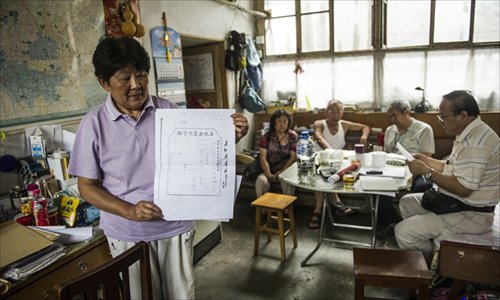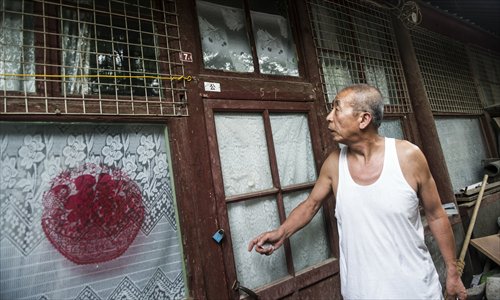|
|
楼主 |
发表于 2013-7-24 18:08:54
|
显示全部楼层
Families fight to recover property taken away during ‘socialist transformation’
Global Times | 2013-7-21 19:58:01
By Yan Shuang
|
|

Qian Juping holds a copy of the title deed to the house her family owned before it was seized by Beijing housing authorities in 1958. Photo: Li Hao/GT

Li Chengzu shows the tag saying "public" on a house near Shichahai in Beijing, which he said was his family's private property taken away from them in 1958. Photo: Li Hao/GT
Since 2006, it has become routine for 59-year-old Li Hongjie to petition at government offices in Beijing. Every Monday, Wednesday and Friday, Li joins a group of residents at the national and municipal housing authorities, to demand a solution to a problem dating back to 1958, when the government collected and took over the management of privately-owned property during a "socialist transformation."
While she is now living in a 30-square-meter house with her sister and father in Baimi Xiejie Hutong, in Beijing's historical Shichahai area, Li has been trying to get back her family's 15 rooms taken in the 1950s. While years of petitioning have failed to bring any major progress, Li's family was told by the local government a few weeks ago that the Shichahai area, where their home is located, will be turned into a cultural zone, a pilot program designed to reduce population density in downtown Beijing's historical districts.
"They asked if I was willing to relocate with compensation," Li said. "But what will happen to my property which is still in government hands?"
Demolition rumors
Earlier in May, rumors started circulating online that some 160,000 square meters of hutong in Shichahai were to be demolished for a commercial makeover, and hundreds of households would be relocated. Although the supervising Xicheng district government denied a massive demolition campaign was underway, and said residents could leave or stay as they wish, house owners like Li still worry that their properties would be at the disposal of developers and become a source of profit for government.
A publicity official with the Shichahai sub-district administration told the Global Times that a large-scale demolition is unlikely, but some old houses will be torn down if they are illegal structures, under poor maintenance, or too old to meet safety standards.
"If they talk the tenants into leaving with compensation, the houses might either be demolished or sold for commercial use after reconstruction. Either way we won't be able to get them back," Li told the Global Times.
Li's family used to own two large properties with 25 rooms in the area and rented out 15 of them in the 1950s. With people flooding into the city after the founding of the People's Republic of China, the Beijing government ordered private house owners, or landlords who had more than 15 rooms for rent, to spare these rooms as apartments for people who had no place to live. In other cities, the benchmark ranged from 100 to 120 square meters. However, many who rented out less properties still saw their houses taken away for public rental.
After that, the government took over the management work, designated properties to different tenants and charged them a rent, of which the original owners took a share of between 20 and 40 percent.
But since 1966, Li has not received his share of the rent. After the Cultural Revolution (1966-76) began, house owners' title deeds were seized and they lost the only evidence they had of ownership. Now, Li's property, just a few meters away from her apartment, has tags saying "public" hanging on the door, denoting public rental houses.
Road to petitions
Li feels that this is the last chance she has to fight for her property before they are knocked down or undergo a makeover to fit into the government's cultural zone.
Her worries are shared by her fellow petitioners, a group of 300 property owners in Beijing. On July 15, some 100 petitioners gathered at the Beijing municipal housing commission for a discussion with officials.
"We're not like the other petitioners. We see petitioning as a fun thing to do," said Ma Jin, one of the petition leaders in Beijing. While a few representatives were allowed to meet and talk with officials inside, the other petitioners stayed outside chatting, or playing cards and other games. The police never interfere or try to drive them away, Ma said, since the house owners know very well what might get themselves into trouble.
For those who are victims of demolition or government commercialization of properties, it is tougher to see petitioning as fun, since they fear their efforts might end in vain during China's demolition campaign launched in the name of preserving historical areas or commercial development.
"We responded to government calls and welcomed their new policies in the 1950s, but look where we are now," said Wang Jilan, who lives among the ruins of her home near the Caishikou subway station in Xicheng with her 92-year-old mother.
Wang's family had 45 rooms, some of which were demolished when the Xicheng government decided to take the land for "governmental reserves." Wang worked for a Beijing-based newspaper, conducted interviews and even wrote a blog, but that did not help to get her appeals addressed.
Recalling the experience of having tenants living next door in the 1950s, Wang said the family and lodgers didn't always get along. "My mother didn't dare draw down the curtains when we went to sleep at night because the tenants saw us as the exploiting class and counter-revolutionary activists," Wang said.
The situation is hardly better now. Qian Juping, another property owner near Shichahai, told the Global Times her family usually gets into disputes with their neighbors, tenants living in her old houses.
Li Chengzu, 66, has been keeping a "petition diary" since 2005. He was detained for five days by police in October that year, when more than 100 property owners nationwide gathered for a sit-in protest at the ministry of housing in Beijing.
Earlier this month, Li Chengzu was told by housing authority employees that his houses are too old to meet safety standards, and needed to be renovated.
"If they want to demolish my houses they'll have to step across my dead body first," said Li Chengzu.
Changes but future unclear
During the earlier years after the Communist Party of China (CPC) founded the People's Republic of China in 1949, private properties were seen as spoils from exploiting the workers and farmers, which should be subject to collective or State ownership. The reckless deprivation of personal ownership reached its peak during the Cultural Revolution.
After the country started to reform from a planning economy to a market one, the awareness of private property protection grew accordingly. In 2002 during the CPC's 16th National Congress, then president Jiang Zemin made it clear all legal gains from entrepreneurs are encouraged and will be legally protected. Laws have been drafted or amended later in this respect.
Fu Tao, a former professional lawyer in Yangzhou, Jiangsu Province, has been helping those whose houses were taken in 1958. A resident fighting for ownership of properties himself, he appeared in court in December last year in Wenzhou as the attorney for a resident who filed a lawsuit against local housing authorities who were alleged to have forcibly demolished his family's old houses.
"Although we lost the case, I'm happy to see the issue of old properties being discussed in court," Fu said.
There have been some changes in places like Guangzhou and Zhuhai, where the properties of overseas Chinese have been returned. In Beijing, after years of petitions some house owners managed to obtain a copy of their original title deed from housing authorities.
Beijing municipal authorities have been returning some of the property "confiscated" from private ownership during the Cultural Revolution, though those taken during the 1950s as public rental houses remain a murky issue.
Fu told the Global Times at least 10 house owners held a protest on July 16 in Hangzhou, and four elderly people had been held by police for a couple of hours.
The Supreme People's Court in 2008 abolished a 1964 judicial interpretation that said houses taken in 1958 by the government could not be inherited. The move defined the ownership of those houses, which are private property, said Fu.
The Chinese government set up offices nationwide in the 1980s to address mistakes of housing authorities, who took extra houses beyond the standard, and many houses were returned. But most houses taken by the standard have not been returned.
There are no official legal stipulations saying that such public rental property is owned by the government, but a document from the Ministry of Housing and Urban-Rural Development in 1985 said the houses should be seen as owned by the State.
Some Beijing residents have filed appeals with the State Council to review the current documentations on properties, and urged them to make corrections so that the original owners could have access to their own property. The housing ministry did not respond to the Global Times' request for an interview.
"It's more than just having owners getting their own houses back. For cities like Beijing, allowing the owners back to take care of the houses is better than any governmental program for preserving historical areas," said Hua Xinmin, a land rights expert and cultural heritage campaigner.
[ 本帖最后由 陆民 于 2013-7-24 18:17 编辑 ] |
|